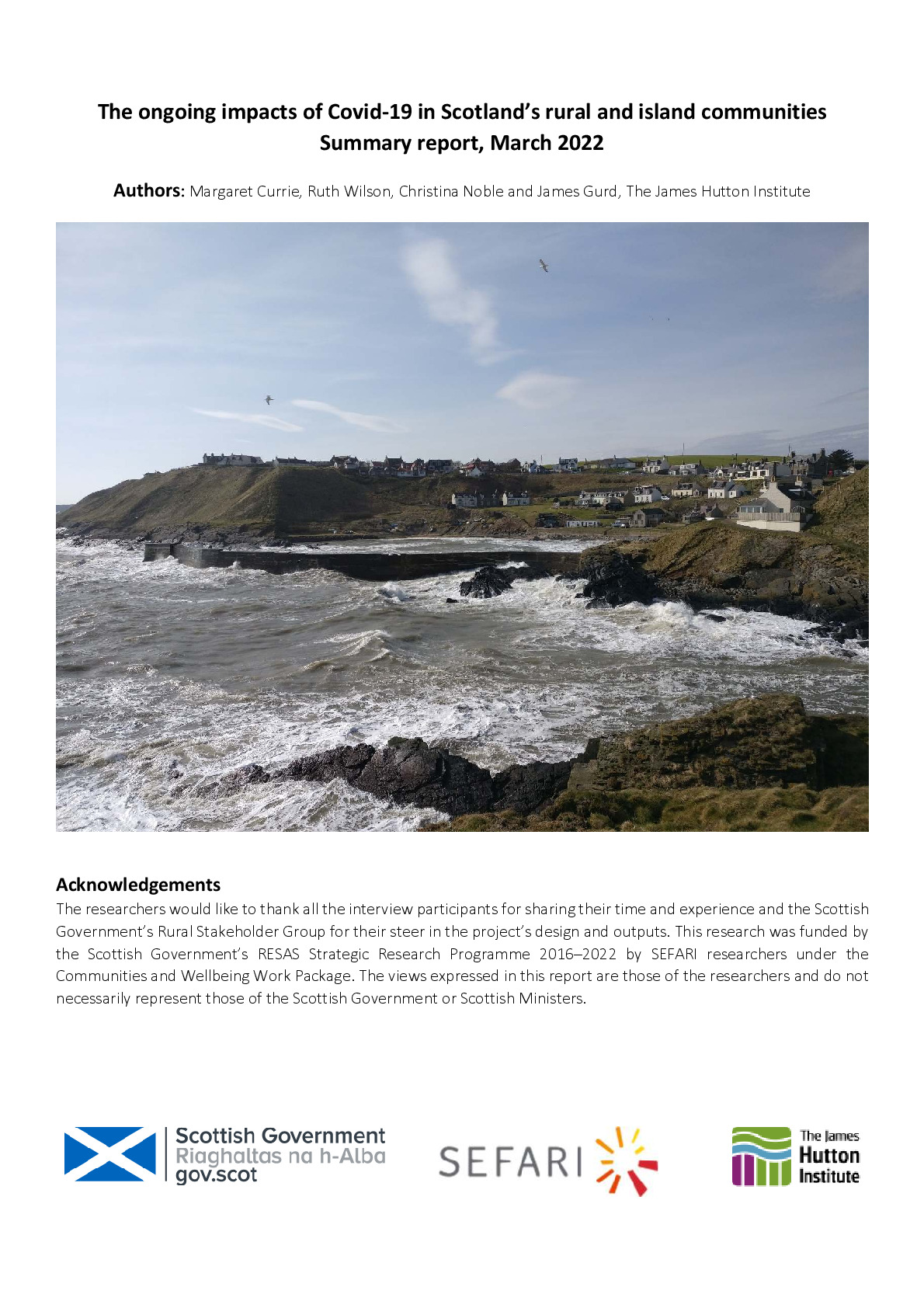Download
Description
Summary report, March 2022
Highlights
What were we trying to find out?
We wanted to learn about the ongoing impacts of the Covid-19 pandemic on rural and island communities, what
approaches have worked well and not so well, future opportunities and challenges, and the most effective ways forward
for recovery, reflecting on the fact that much has changed in the 12 months since the first report was published.
What did we do?
We conducted follow-up interviews with a group of the rural and island stakeholders we originally spoke to in summer
2020, spanning a range of geographies and interests.
What did we learn?
Communities: Although communities have responded well to the Covid-19 pandemic, they are now facing burn-out and
require support more than ever.
Economy: While there are positive signs for the rural economy, such as working from home and an appetite to start
entrepreneurial activity, there was a worry that the rural economy needs to become more diversified and that the full
economic impacts are still to be realised. For example, measures put in place in response to the Omicron variant had a
profound impact on the resilience and survival of many rural businesses.
Environment: Interviewees noted that the climate crisis still requires a rapid and radical response. This could bring
benefits to rural and island communities in the form of building local expertise to deliver new technologies, which was
expected to result in employment opportunities for young people.
Migration: There is evidence of migration to rural and island communities, however this has brough challenges, such as
housing availability and affordability and questions about the benefits to local communities and economies.
Digital: The pandemic has led to the mass movement of activities online, enabling organisations to reach remote and
island communities more easily and effectively. Interviewees were generally optimistic about this trend but underlined
the urgency of bridging digital divides.
Mental health: More attention was given to this theme in the follow-up interviews, with increased concern about the
ongoing impact of the pandemic on mental health. Some progress has been made in responding to this increased
demand on mental health services but there was concern that the full impacts have yet to be realised.
Government response (including funding mechanisms): The Scottish Government response was broadly praised, with
interviewees recognising numerous policy developments during the pandemic, which will assist communities in their
recovery. However, there was concern that these instruments could be better joined-up to maximise benefits.
What do we recommend?
Our interviewees suggested the following modifications and additions to the original recommendations, based on their
experiences during the intervening period:
1. Build on existing/new partnerships to bring together policies from different sectors and support community anchor
organisations.
2. Retain and enhance digital connectivity opportunities.
3. Continue to support diversification of the rural economy, including away from its dependency on tourism.
4. Enhance the knowledge base about local-regional vulnerabilities and differences and ensure that these are
embedded in policy.
5. Retain a flexible, targeted and responsive approach to financial support, with simplified funding requirements.
6. Put in place the infrastructure and resources that are needed to unleash and support community-led action and
build wellbeing economies from the bottom up.
7. Encourage and support young people to move to and stay in rural and island communities, focusing on access to
jobs (including decentralisation of public sector jobs), apprenticeships, affordable housing and crofts.
8. Support small, adaptable local businesses.
9. Encourage strategic partnerships at different scales that deliver place-based solutions.
10. Provide services to support the ongoing impact of the pandemic on mental (and physical) health.
Note: The earlier (first) report is 'Understanding the response to Covid-19 - Exploring options for a resilient social and economic recovery in Scotland’s rural and island communities'.
